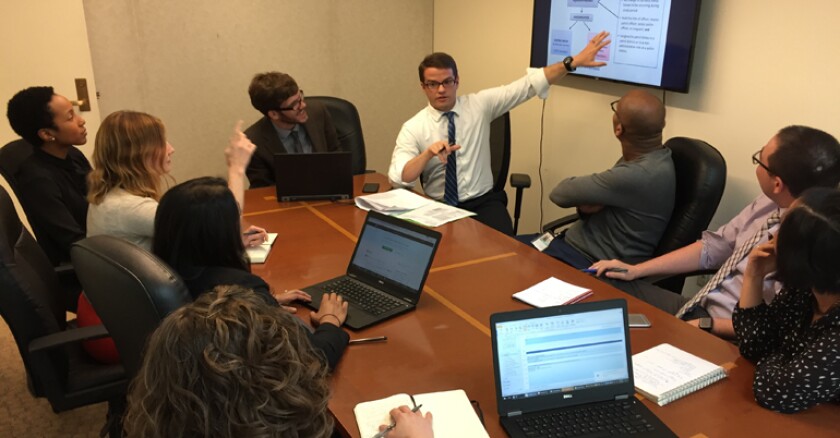The Lab @ D.C., which is set to launch its website in May, is different. For at least the next two years, the District of Columbia will employ a team of social scientists to study and address public problems. The researchers' expertise have a wide range -- from economics and statistics to sociology and psychology.
The scientists at the Lab are full-time government employees who respond to research requests from any agency in the District. It's a rare effort by a state or local government to integrate scientific research with the evaluation and creation of public policy.
“We are trying to expand to a different type of career in government,” says David Yokum, the Lab’s director who previously oversaw the Office of Evaluation Sciences in the U.S. General Services Administration. “What we’re doing in here is on-the-fly [and] in-the-trenches applied research, doing data analytics, doing field experiments. We’re generating evidence in real-time.”
The Lab's current projects include an investigation of how body cameras influence citizen and police behavior, an experiment to discover the best ways to boost police recruits and a study of which local workforce training programs most often result in employment.
The Lab @ D.C. is part of a larger project funded by the Laura and John Arnold Foundation, which supports similar "policy labs" in Houston, Rhode Island and Michigan. In each case, the foundation awarded several million dollars in seed money for a three-year demonstration, hoping that the state or local governments will sustain the effort with their own funding after that. Unlike the Lab @ D.C., the other three policy labs are headquartered at a local university -- though they all work closely with government officials.
The Houston Education Research Consortium (HERC) started in 2011, and academics at Rice University's Kinder Institute for Urban Research have been meeting weekly with officials from the Houston Independent School District ever since.
Ruth Turley, a sociologist who directs HERC, revels in the collaboration.
"We're used to developing our own research questions, choosing our own research sites and then publishing in academic journals that nobody reads," she says. With HERC, "we're developing the questions together with the potential users of that research from the beginning."
So far, the lab has produced 20 reports and is juggling about a dozen research projects. In one ongoing study, HERC is evaluating the impacts that school closures have on students. While results from that project aren't available yet, others are. For example, HERC has found that having full-time college advisors in high schools increases the rate of college applications. In another experiment, researchers found that the reading programs for elementary schoolers didn't improve literacy rates.
"It was disappointing and surprising, but the [school] district took that information and stopped spending all that money on this program that didn't seem to help," says Turley. "It's just as helpful to find that something isn't working as it is to find something that is."
Because of the lab's productivity and impact, the decision to keep funding it once the initial grant ran out was a no-brainer. The Kinder Foundation donated $10.7 million to keep HERC going.
Meanwhile, the Rhode Island Innovative Policy Lab (RIIPL), which has operated out of Brown University since 2015, has helped the state government integrate and manage its administrative data so that researchers have better information at their fingertips for answering policy questions. RIIPL is currently studying ways to reduce prisoner recidivism and why people who are eligible for federal nutrition assistance don't always take advantage of the program.
Faculty involved with RIIPL still apply for research grants and publish in peer-reviewed journals, but like their peers in Houston, they meet regularly with government partners and try to make sure the questions they investigate matter to public officials.
"We don't feel that research and scholarship need to be divorced from impact," says Justine Hastings, an economist at Brown who directs RIIPL. "We believe in engaged research."
D.C. has received $3.5 million to create its Lab. When that funding runs its course after a few years, District officials will have to decide whether its activities merit the roughly $1 million a year it would likely cost taxpayers. Being scientists, it's far too early in their studies to make a conclusion.
“We are, ourselves, an experiment,” says Yokum.









